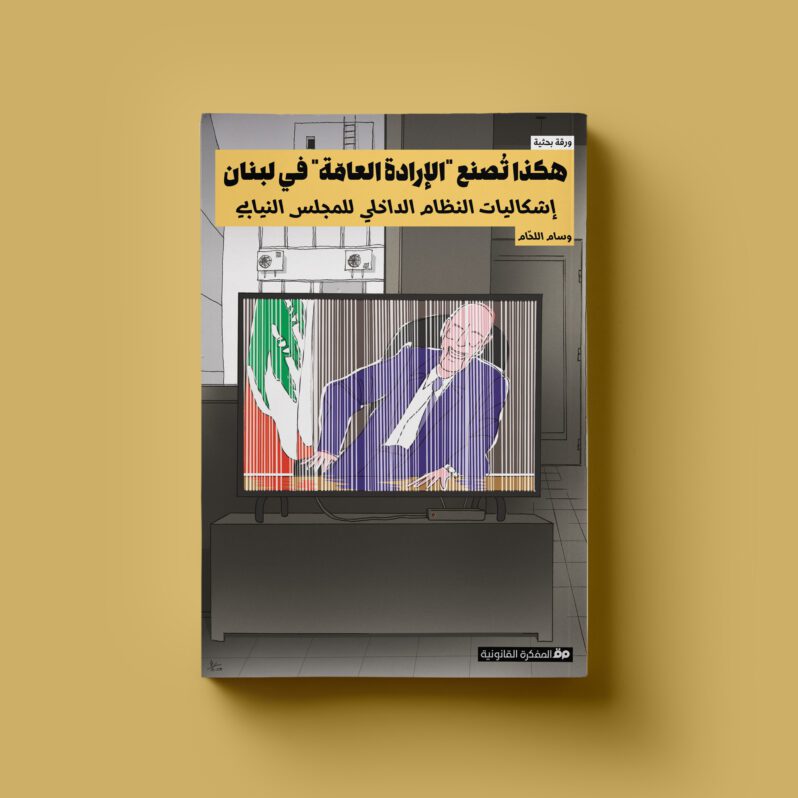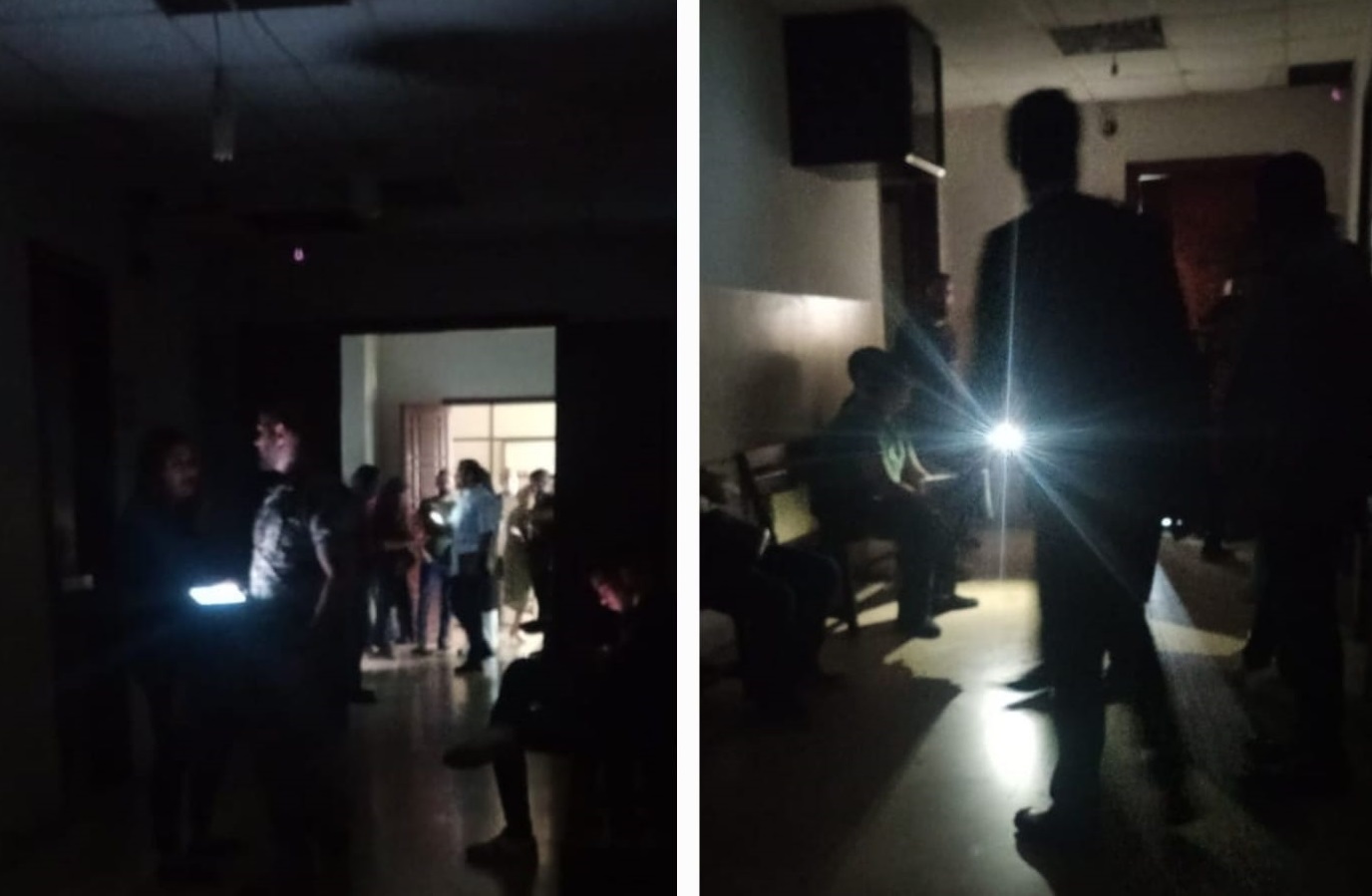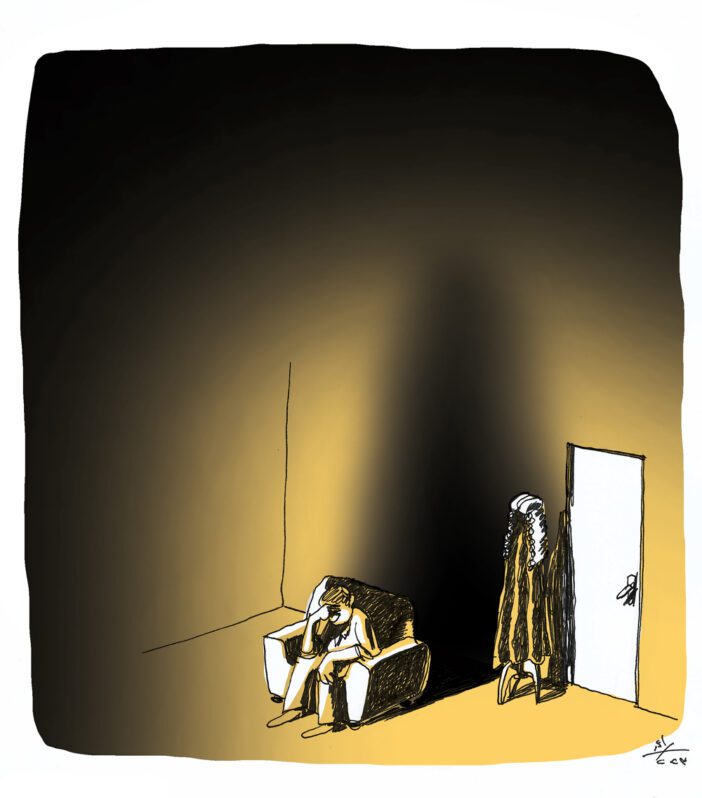Beyond Sectarianism: Whom Does the Lebanese State Serve? (II)

In this part of the series, I will present the most important pillars that the rule of leaders [paradigm] [Hukm al-zu’ama] was established upon, striving in each case to prove that these pillars have become largely independent of political sectarianism in the narrow sense of the term. This article is divided into two sections: the first addresses the leaders’ monopolization of public decision-making, and the second addresses accountability.
The leaders’ Monopolization of Public Decision-Making
In this section, I will explain the pillars that have allowed the leaders to monopolize public decision-making, particularly the ones that have allowed them to do so via representation, in addition to hierarchy and the placement of obstacles between the citizens and the courts.
Monopolization via Representation
In this regard, the first thing that concerns us is the parliamentary electoral law.
The notion that political sectarianism is causing the polarization during parliamentary elections is incorrect. Contrary to what some people may believe, the main secret to the electoral laws is not sectarianism, but the disputes between leaders over drawing the “districts of influence”. In these disputes, each leader strives to increase his share at the expense of others.
The best evidence of this is the longstanding agreement on the use of the simple majority system with multi-seat electorates. With each new electoral cycle, dozens of experts work on a new [electoral] law. These experts propose dozens of electoral systems, but in the end, the multi-seat majority system prevails. This means that the list or party that wins in an electorate acquires all of its seats, which entrenches [the zu’ama paradigm or regime of leaders] in that electorate and increases the risks of hegemony, and therefore of marginalization. This system is a rare case in the context of modern electoral systems as it is distinguished by the desire to consolidate the supremacy of the most powerful, while indiscriminately marginalizing all the minority parties.
In reality, the aforementioned system is a sign of the regime of leaders with the most powerful [leader] single handedly leading the many. It resembles a feudal system, at the heart of which is a feudal lord. It is in principle a contradiction of consociationalism, which is supposed to establish mechanisms that ensure the representation of all parties according to the amount of support they enjoy (i.e., a proportional system).
The second example is the process through which the electorates are drawn up. Unlike the majority system which remains fixed, post-Taif legislators endeavor to redraw these electorates every electoral cycle in light of the balances of power between leaders. The main problem is not ensuring sound representation, but determining who the influential persons in these electorates are. This process resembles an act of quota-sharing that favors one leader or another, in accordance with the surrounding circumstances. Hence, instead of a leader emerging from the ballot boxes in a defined electorate, the electorate comes out of the leader’s hat and its borders drawn, either more broadly (in a juggernaut fashion) or narrowly, in accordance with the importance of their influence. In this sense, electorates resemble dominions delimited only by the leaders’ abilities to spread their influence. All other arguments and criteria are merely attempts to whitewash the matter. As such, a leader with influence in a mixed district may call for national unity and intermixing of the sects, while a leader who has influence in small electorates may call for homogeneous electorates to be employed, as Maronite Patriarch Nasrallah Sfeir did when he stated, “we have 64 parliamentary seats that we want to elect ourselves”.
The same approach is employed in municipal elections, which follow the majority system. Even though they are not based on a sectarian division of seats, most municipal councils are subordinate to sectarian leaders. To this day, the system has sought to preclude any attempt to break the connection between the municipalities and the central government, which is under the leaders’ influence. Municipal councils are thus either kept under control through municipal elections, or in their elections, or by virtue of their extreme subordination to central administrative authority. Irrespective of sectarian considerations, the state remains biased towards extreme administrative centralism due to its bias towards the influential persons who control it. This bias is evident not only in the number of local (i.e., municipal) decisions encompassed by [the central government’s] prior oversight, but also in the broad margin that the central government has been given to influence the resources available to the municipal councils, and differentiate between those councils in a manner that encourages clientelism and nepotism. The best example of this is the handing of the Independent Municipal Fund, which is composed of taxes that the central government collects and is earmarked for distribution to the municipal councils. Its name notwithstanding, this fund is fully controlled by the central government as it is administered by the minister of finance and the minister of interior. The state has exploited its control over this fund to supplant the municipal councils in determining how the designated monies are spent. The most notorious contract in this regard may be the one signed with the [waste management] company Sukleen. As a result of this contract, Sukleen received the largest share of the fund’s returns. It is now known that the contracting process was tarnished by corruption. In practice, this corruption squandered the fund’s money and divided it between various leaders in accordance with the logic of quota-sharing.
In the same vein, the regime has curtailed all of the representative frameworks that the leaders do not monopolize and that facilitate broad social participation in the debating of public affairs. The first example of this behavior is the Economic and Social Council, which was established in accordance with the Taif Agreement. The law that established the council stipulated that economic, social, and occupational sectors participate in the formulation of the state’s economic and social policies. It took five years to introduce this law (1995), a clear sign of hesitation over setting up the council. The determination of the council’s functions followed the same course: in principle the council examines the issues that the prime minister refers to it on behalf of the government within the timeframe that they set. The law did stipulate that the council could examine economic and social issues on its own accord. However, monetary and financial matters, including the public budget laws and their supplements, were excluded. This stance reflected the red lines drawn by the regime at the time. Most importantly, though, this council has been completely inactive since 2002.
In the same context, the right of participation has been marginalized. With the exception of some of the texts relating to children and the rights of persons with special needs, there is no legal framework ensuring the participation of social bodies in the debating of public decisions. Such a framework could include, for example, involving social groups in parliamentary committees.
Similarly, the Lebanese University Law was amended in 1991 to remove the representatives of the Union of Lebanese University Students from the university’s council after the student movement had imposed their presence therein in 1972. Of course, this was possible due to the branching of the university and the fragmentation of the students into cliques within the orbit of the leaders.
Super Hierarchy Within Public Administrations
The second issue, which again demonstrates the state’s bias towards influential persons, is the deep-seated hierarchy within public administrations which ensures the leaders’ hegemony over them. As was the case above, this issue is also unconnected to sectarianism.
In public administrations, the departments generally answer to the person presiding over them, who in turn answers to the person presiding over them. Furthermore, there are no collective organizations for public officials. The hierarchy is exacerbated by the restriction of public officials’ freedom of assembly and freedom of expression under the banner of “the duty of restraint”. Having already banned officials from engaging in politics and belonging to political parties or organizations (1953), striking, joining trade unions, and organizing or participating in job-related petitions (1964), the law in 1992 banned officials from delivering or distributing speeches, articles, statements, or writings on any matter whatsoever without written permission from the departmental head. Further exacerbating this hierarchy is the recourse to contracting, which offers no job security and therefore deprives public servants of any guarantee of vocational stability. Similarly, promotions remain contingent on the departmental head.
Hierarchy also reigns within the judiciary. It is maintained, in particular, via the Supreme Judicial Council. This council generally controls the career path of judges through its determination of transfers and appointments, which are usually used to reward or punish judges or remove them from cases (judges have no safeguards against being transferred). This process is also used to appoint persons loyal to the leaders in judicial positions that interest them. Note that the government appoints, either directly or indirectly, eight members of the aforementioned ten-member council, which means that it is more representative of the government and its interests than of the judiciary. Hence, the political authorities can intervene in the judiciary and impose their will in a number of its positions via the Supreme Judicial Council, which is essentially its arm within the judiciary. This strengthens the culture of interference in the judiciary at the expense of the culture of judicial independence, and transfers the task of protecting citizens from danger from the judicial authority to the leaders who control it.
What applies to judges in general is especially applicable to the public prosecution offices, which are subject to the principle of hierarchical organization. Due to the expansion in the application of this principle, all workers in the public prosecution offices are now subordinate to the public prosecutor in the Court of Cassation.
Making matters worse, the judge has no right to participate, not even by expressing their opinion, in the administration of any judicial facility. Similarly, judges are subject, according to the minister of justice and the Supreme Judicial Council, to the duty of reservation and the prohibitions mentioned earlier. Hence, unlike their counterparts in most European and some Arab countries, Lebanese judges have no national organization.
The Marginalization of Opportunities for Direct Democracy: Attempts to Build Barricades Between the Justice System and the Community
In addition to the aforementioned mechanisms, the regime works tirelessly to limit the possibility of decisions with public dimensions being made outside, or on the margins of the institutions that it monopolizes. Going against the global trends towards acknowledging the pioneering role played by judges in developing and harmonizing laws, the regime appears to be highly sensitive about delimiting the judges’ role in serving the law. It takes a strict stance against any attempt by judges to expansively interpret or transcend legal texts. Hence, in parallel with the discourse that silences any criticism of the judiciary under the guise of the judiciary’s prestige, the government has no qualms about reprimanding any judge who deviates from its preferred stance in order to justly serve a woman or a child. The best example of this behavior is the responses to the ruling issued by the Matn Court of First Instance in 2009 in relation to the right of Lebanese women to pass their nationality on to their children born to non-Lebanese fathers; in a press conference a parliamentarian did not hesitate to denounce the ruling and warn of its repercussions, as though he were Cassandra prophesying the destruction of Troy (see my article titled ‘If the Judge Uses discretion!’, published in Arabic by al-Akhbar on September 23, 2009). Making matters worse is the government’s attempts to separate the justice system from the community. Alongside the duty of reservation (and its repression of judges’ freedom), the Beirut Bar Association issues circulates banning lawyers from making any statement about cases pending before the courts, whether they are assigned to these cases or not.
Hence, the regime appears to be trying to reduce any rights-based thinking about the laws developed by the councils it monopolizes. It seems to be trying to deprive the courthouses of any active pioneering role in society, and to turn judges into false witnesses who apply the legal texts without any critical sensibility and regardless of whatever injustice tarnishes them. In any event, it is trying to drown one of the most important arenas [for discussing social issues], namely, the arena of the judiciary. Many of society’s grievances -the grievances of the people- remain forgotten, and hidden behind the justice system’s walls, which are starting to resemble the walls that hide slums.
Quota-Sharing and Courtesy in the Place of Accountability and Control
The principle of the separation of powers is the primary adversary of the current regime. As previously explained, authorities in Lebanon are divided not between institutions, but between leaders in a system that does not lend itself to accountability. What then are the most appropriate mechanisms of coexistence for administering public affairs? The answer seems obvious: consociation, quota-sharing, and courtesy/favouritism [mujamala].
It is therefore natural for some flexible, conciliatory figures to be appointed to embellish the regime, circulate disagreements, and preserve specific balances between the interests and aims of the political class. These figures exemplify the kind of discourse that does not shy away from saying one thing and then another for the sake of keeping all parties content, and preventing attack on any of the influential persons.
It is also natural that the organs of accountability are curtailed, suspended, or turned into organs that ensure that all parties apply mujamala appropriately, hence, the popularity of the phrase “security via consensus” and by extension perhaps “justice by consensus”.
Besides the Supreme Council for trying presidents and ministers, which has never convened to hold any of these figures accountable, the best example in this area is the Constitutional Council. This council is supposed to be the only one capable of ensuring that the actions of the political class, especially the actions of parliament, comply with the Constitution.
The problem with this council is not only the method through which its members are appointed (half by parliament and half by the government, i.e., the council of ministers). Rather, it is also the trend that persists with every new era or parliament, namely that of amending the council’s by-law in a manner that subjugates it or even of getting rid of the previously appointed members. Thus, at the beginning of the presidency of Emile Lahoud, the parliament reduced the majority required to adopt a decision to cancel parliamentary elections from a seven-member majority to a relative majority, thereby giving the members appointed by Lahoud (who made up half of the council) the power to impose their preference. Similarly, the governments that followed the Syrian withdrawal did not hesitate to introduce one law to suspend the operation of the Constitutional Council, and then another to purge all of its members.
Moreover, the leaders went so far in their boorishness as to present the council’s members (who are supposed to protect the system’s principles against the desires of the political class, or even the instincts of the people) as job-seekers by making them present their candidacies and then subjecting them to interviews (which were subsequently cancelled). Hence, in the wake of the Doha Agreement, the media circulated the councilors’ names as though it were illustrating the hallmarks of quota-sharing between leaders (six for the leader with the majority [in Parliament], three for the opposition, and one for the president), without any of the leaders objecting to being classified into one column or another.
This article is an edited translation from Arabic.



